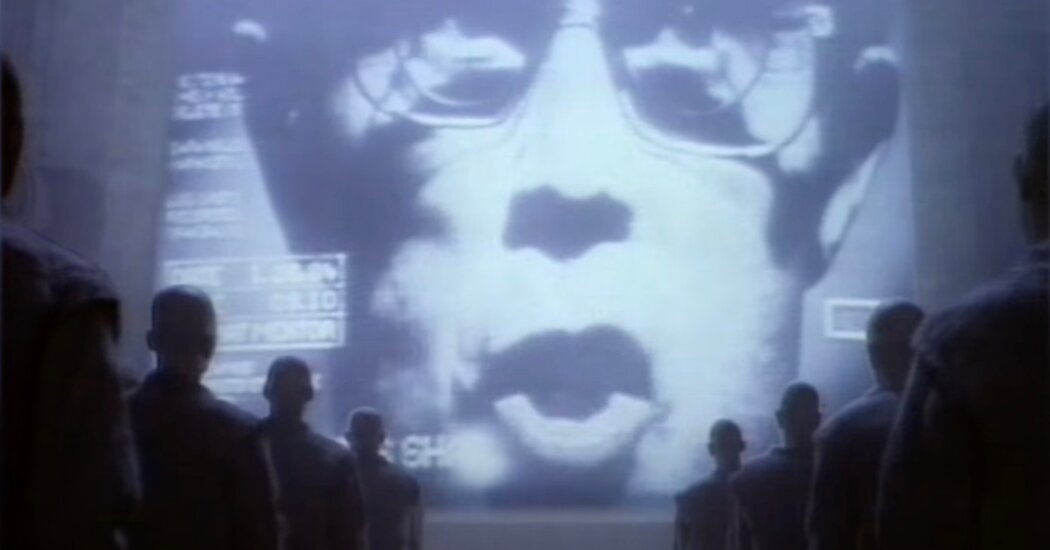Steve Hayden, an award-winning advertising writer and executive who helped create the thunderclap of a television commercial in 1984 that positioned Apple’s new Macintosh personal computer as a weapon for creative freedom, died on Aug. 27 in Patchogue, N.Y., on Long Island. He was 78.
His death, in a hospital near his home in Bellport, was confirmed by his partner, Kristina Allen. She did not specify the cause.
Mr. Hayden played important roles in advertising campaigns for IBM, Motorola and other clients. But he was best known for his collaboration (with, among others, the director Ridley Scott and Lee Clow, the creative director of the Chiat/Day ad agency) on the 60-second commercial that introduced the Macintosh, without showing it — and that ran only once, during the Super Bowl on Jan. 22, 1984.
Mr. Hayden was a copywriter for Chiat/Day when, as he later recalled, Steve Jobs, Apple’s co-founder and chairman, told the agency in 1983 that he wanted a commercial for the Macintosh that would “stop the world in its tracks.” The creative team brainstormed about a theme surrounding “Nineteen Eighty-Four,” George Orwell’s 1949 novel depicting a future in which a totalitarian regime led by a man known as Big Brother suppresses critical thought. The ad was widely viewed as an implicit attack against IBM, Apple’s rival.
“Given the sunny good nature of the average person,” Mr. Hayden said in an oral history interview with The New York Times in 2024 about the making of the commercial, “wouldn’t this be a great tool to rebel against government overreach, especially in parts of the world where news is suppressed, manipulated or so tightly controlled it was useless to people?”
In the commercial, a female runner, wearing a Macintosh tank top and brandishing a large sledgehammer, is chased by police in riot gear. As she enters an assembly hall, a menacing figure, evoking Big Brother, is seen on a giant screen delivering a fanatical rant — written by Mr. Hayden using quotations from Mussolini, Mao, Hitler and Goebbels — to an army of slack-jawed drones.
The runner flings her hammer at the screen, destroying it in a massive explosion. A voice-over, reading from an onscreen scroll, says: “On January 24th, Apple Computer will introduce Macintosh. And you’ll see why 1984 won’t be like ‘1984.’”
The ad won a Clio Award for excellence in advertising and the Grand Prix at the International Advertising Film Festival in Cannes, France (now the Cannes Lions International Festival of Creativity). In 1995 it was named the greatest television commercial of all time by Advertising Age. And it helped usher in the era of blockbuster Super Bowl commercials.
“‘1984’ said that Super Bowl ads were going to be little movies with a highbrow edge on some occasions,” said Robert Thompson, the director of the Bleier Center for Television and Popular Culture at Syracuse University. “It was so artsy — the thing had elements of literature and Fritz Lang’s ‘Metropolis.’”
The ad was a creative triumph and helped sell many more Macintoshes than Apple had expected. But when Mr. Hayden and his team (including the director Tony Scott, Ridley’s brother) created a dramatic but somber sequel, known as “Lemmings,” to run during the next year’s Super Bowl, it was a critical flop.
In that spot, which introduced the Macintosh Office product line, a long line of blindfolded executives — whistling “Heigh Ho,” the jolly off-to-work song from “Snow White and the Seven Dwarfs” (1937) — jump off a cliff because they will not question business as usual (which was perceived as another shot at IBM).
“I often remind people about ‘Lemmings’ as proof of karmic balance,” Mr. Hayden said, with a laugh, to Forbes magazine in 2012.
“What was missing from ‘Lemmings,’” he added, “was the girl in ‘1984,’ the savior who says, ‘The world could be different than this.’”
Stephen Edward Hayden was born on May 21, 1947, in St. Charles, Mo., a suburb of St. Louis. The youngest of four brothers, he moved with his family to San Jose, Calif., when he was a baby. His father, Ralph, was an internist, and his mother, Gertrude, was an opera singer and church organist.
Steve learned to play the cello at a young age and continued his musical studies at the Interlochen Arts Academy in Michigan and at the University of Southern California, where he earned a bachelor’s degree in English in 1968.
Inspired by Volkswagen’s “Think Small” campaign — and knowing that he was not a great cellist — Mr. Hayden entered advertising, first as a junior copywriter for the agency McManus, John & Adams in Detroit, where he worked on the General Motors account, and then with several agencies, including Clinton E. Frank, where he was a group creative director; Foote, Cone & Belding; and Chiat/Day, where he opened the company’s New York office in 1979 and then, as creative director in Los Angeles, worked on the Apple account.
He left for BBDO/San Francisco shortly before Mr. Jobs resigned from Apple after a power struggle with the company’s president, John Sculley. In 1987 he rose to chief creative officer of BBDO/Los Angeles, where was reunited with the Apple account, which had left Chiat/Day. In 1989 he became chairman and chief executive of BBDO West, where for five years he led winning bids for Pizza Hut and other accounts.
“Industrial Revelation,” an Apple ad in 1990 that was overseen by Mr. Hayden, introduced an affordably priced Macintosh. In it, shots of a college professor mesmerizing a class with a lecture about industrial and social change are intercut with clips of Macintoshes being manufactured.
In 1994, Mr. Hayden was recruited to Ogilvy & Mather, where, in a bit of irony, he was placed in charge of the IBM account, as president of brand services. He was not heavily involved with the creative side of IBM’s advertising at first, but moved back into that arena full time when he was named vice chairman and creative officer in 2001.
Under his leadership, Ogilvy created campaigns in the late 1990s that made IBM a more likable company and promoted its role in e-business with commercials that turned workplace problems into easy-to-understand stories.
Shelly Lazarus, Ogilvy & Mather’s former chief executive, recalled Mr. Hayden’s ability to distill complexity into simple, marketable concepts.
“I sat with him through 14 hours of being briefed by Motorola, and at the end, I said to him, ‘I’m overwhelmed,’” she said in an interview. “He said: ‘It’s not really complicated. It’s intelligence everywhere.’ All of a sudden, 14 hours were reduced to two words. He did that all the time.”
Mr. Hayden was instrumental in creating the quirky and popular “Hello Moto” campaign, which helped rejuvenate Motorola’s image and cellphone sales in the early 2000s. He also oversaw campaigns for companies like American Express and Dove, most famously its “Real Women” ads featuring a variety of body types.
In a statement after his death, Ogilvy said that Mr. Hayden “was a copywriter at heart who believed in the power of words to move, to persuade and to connect,” adding, “As he once said, ‘If you want to be a great copywriter, please your reader.’”
In 2013, he was elected to the Creative Hall of Fame of the One Club for Creativity, a nonprofit that promotes excellence in advertising.
After retiring in 2011, he served on the boards of Interlochen and the Damon Runyon Cancer Research Foundation.
In addition to Ms. Allen, Mr. Hayden is survived by a brother, David. His marriages to Nancy Ferguson and Anne Taylor ended in divorce.
Mr. Hayden said he first realized that a career as a writer was possible when he was in high school.
“I had a history teacher who wrote on one of my papers, ‘With work you could be impressive or you could just end up a clever phrasemaker,’” he recalled when he gave Interlochen’s commencement address in 2019. “And I thought to myself, ‘People will pay you for clever phrasemaking?’”
Richard Sandomir, an obituaries reporter, has been writing for The Times for more than three decades.
The post Steve Hayden, Writer Behind Apple’s ‘1984’ Commercial, Dies at 78 appeared first on New York Times.




